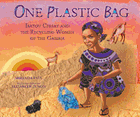
This uplifting picture book by debut author Miranda Paul speaks to the power of one person to make a difference for many.
Isatou Ceesay is a real person who used a plastic bag, after her grandmother's basket broke, to carry her fruit back to her village of Njau in Gambia. She leaves the broken basket to "crumble and mix back in with the dirt." Elizabeth Zunon (The Boy Who Harnessed the Wind, picture book edition) creates collage compositions with light-filled photographs of forests trimmed into leaf-shapes, and sumptuous fabrics pieced together for Isatou's mbuba (long dress). When Isatou's plastic bag eventually breaks, she discards it, too. But unlike Grandmother's basket, the plastic does not crumble and mix back in with the dirt. Instead, "one plastic bag becomes two. Then ten. Then a hundred." The village goats ingest the bags and die, and mosquitoes collect in the dirty pools of water trapped by the bags. Then Isatou gets an idea: she can cut the bags into plastic strips and crochet them into purses. Zunon dresses the women helping Isatou in fabric collages of glorious colors and patterns, and layered textures of the plastic threads give the compositions a tactile quality. Paul's gentle repetition plays up the transformation of the plastic bags, as one woman chooses a crocheted purse "and shows it to one friend. Then two. Then ten."
Paul dots the text with Wolof phrases, and includes a glossary, along with a timeline and further reading for young people about other entrepreneurs in Uganda, Ghana and Kenya. Inspiring. --Jennifer M. Brown, children's editor, Shelf Awareness

